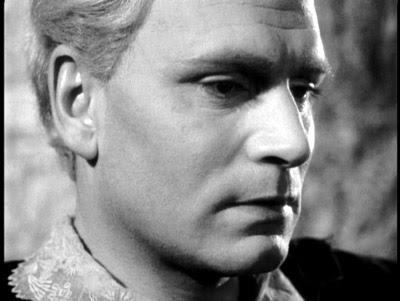 Jacobi's Hamlet is a proactive one, in the scene from the start. His first line is NOT an aside, it is spoken out loud and full of scorn. This Hamlet is asking for a fight, goading Claudius, but the new king won't be stirred to anger in front of the Court. This is the first time I've really thought about it, but Hamlet no doubt grew up with his uncle around and knows his flaws. It's how he's judged him unfit to marry his mother. In this performance, Jacobi is clearer than most about those flaws. Often, Hamlet in unhappy about the situation, but here he hints at why Claudius is such a "satyr".
Jacobi's Hamlet is a proactive one, in the scene from the start. His first line is NOT an aside, it is spoken out loud and full of scorn. This Hamlet is asking for a fight, goading Claudius, but the new king won't be stirred to anger in front of the Court. This is the first time I've really thought about it, but Hamlet no doubt grew up with his uncle around and knows his flaws. It's how he's judged him unfit to marry his mother. In this performance, Jacobi is clearer than most about those flaws. Often, Hamlet in unhappy about the situation, but here he hints at why Claudius is such a "satyr".An incomprehending mother responds with platitudes, the same kind that Claudius uses to calm the peasantry, but she may actually believe. As he chides Hamlet, Gertrude's hand often goes to her husband, as if to restrain him from being too harsh. Such is the relationship inside which Hamlet is trapped. The staging is apt: Hamlet keeps his distance until he makes that first speech (usually one pronounced in sadness, but here more in bitterness). When his mother speaks to him, he turns his head around. When Claudius does, he keeps his back turned to him.
 Later, he looks almost sick when Claudius has his paws on him and tells him he is most immediate to the throne, at which point he scampers away. The story is told in body language. An interesting choice: Hamlet bursts out laughing at the line "'Tis unmanly grief", as if he either kind of agrees and laughs at himself, or believes that his too much grief is manly grief indeed, or possibly that he doesn't think much of Claudius' manliness and/or grief. The latter is probably the best interpretation. He shows too much grief precisely because his parents show too little.
Later, he looks almost sick when Claudius has his paws on him and tells him he is most immediate to the throne, at which point he scampers away. The story is told in body language. An interesting choice: Hamlet bursts out laughing at the line "'Tis unmanly grief", as if he either kind of agrees and laughs at himself, or believes that his too much grief is manly grief indeed, or possibly that he doesn't think much of Claudius' manliness and/or grief. The latter is probably the best interpretation. He shows too much grief precisely because his parents show too little.When Hamlet agrees to stay at Elsinore, that agreement is sarcastic indeed, but Claudius once again Claudius is too political to acknowledge it. He takes it at face value, spin doctoring the line in situ, if you will. Then, the Court leaves Hamlet alone.
 Though he remains bitter and sarcastic through the first part of the scene, sadness finally creeps into his voice fully during the soliloquy. Here he is alone and may speak his true emotion. A device used here and throughout the play is speaking directly into the camera at the audience.
Though he remains bitter and sarcastic through the first part of the scene, sadness finally creeps into his voice fully during the soliloquy. Here he is alone and may speak his true emotion. A device used here and throughout the play is speaking directly into the camera at the audience. A perfectly acceptable way to do theatrical asides, but it can be unsettling. Good. We should be unsettled by this rotten Denmark. You don't think a character should break the fourth wall? Fine. Brothers shouldn't marry sisters and wives should grieve for their husbands. Time - and theatrical presentation - is out of joint here.
A perfectly acceptable way to do theatrical asides, but it can be unsettling. Good. We should be unsettled by this rotten Denmark. You don't think a character should break the fourth wall? Fine. Brothers shouldn't marry sisters and wives should grieve for their husbands. Time - and theatrical presentation - is out of joint here.But break, my heart; for I must hold my tongue.
On that last line, Hamlet has another of those sad laughs. Jacobi infuses the character with a certain self-deprecation because the soul-searching Hamlet knows full well his fault. He MUST hold his tongue simply because that's how he is and he knows it. It's a nuance that takes the political and familial away from center stage and rather makes Hamlet's psychology the cause of his silence and delay.
















































